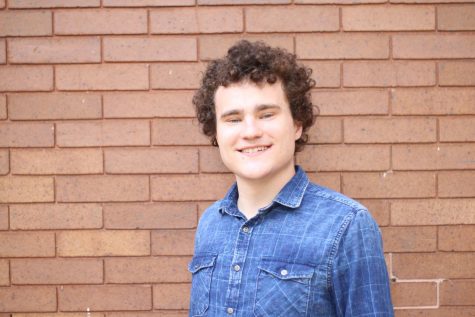English Colloquium discusses the evolution of Genre
September 13, 2019
The crowd bled out of Guilford Parlor into the English department lobby for a “Roundtable on Genre,” focusing on tragedy, pastoral and the American sonnet. The panel featured three members of the department: Associate Professor Maggie Vinter, Lecturer Denna Iammarino and Ph.D. student Cammy Ring.
The panel was part of the English Colloquia series of talks that occur every Friday at 3:15 p.m. Vinter said the series started in 2013, as “we wanted to bridge some of the gaps between the literary scholarship and creative writing.”
The three academics discussed how awareness of the conventions of these three genres can affect the ways authors use them to surprise modern audiences and how literary critics should analyze them. All three genres are associated with 16th-century England.
Pastoral poetry, such as the poems of Edmund Spenser, is devoted to an idealization of rural life and the natural world. Iammarino discussed how poets used the genre to discuss more pressing environmental issues like global warming and deforestation.
The sonnet, traditionally a 14-line poem with 10 syllables per line, is most recognizable through William Shakespeare’s use of the form. The sonnets of Shakespeare are a key part of British national identity. In the British cultural garden in Cleveland, there is a bust of the playwright’s head. American poets either use the form to celebrate American myths or prove them wrong.
The sonnet form was picked up by American poets like Billy Collins, who used the form as a way to mythologize America as a place of new world innovation. Ring pointed out that this is a simplistic view of America, as rebellion is not an ideal unique to America by any means. Ring said that white America’s myth of itself, based on the idea of new world innovation, excludes black Americans.
Now, the sonnet form has been claimed by many black and gay poets. The aforementioned Hayes uses the sonnet to create political work, adapting a form often considered solely useful for declarations of love as a way to advocate for social change.
“I lock you in an American sonnet that is part prison, part panic closet, a little room in a house set aflame,” writes Hayes in his “American Sonnet for My Past and Future Assassin.”
Unlike the other two genres that have fairly clear definitions, Vinter argued that tragedy is nearly impossible to define, citing how thinkers from various cultural contexts have different definitions of tragedy.
“Tragedy is a hard thing to define because the word has been applied to so many different objects over such a long period of time,” said Vinter. “There’s no consensus about the property medium product or subject matter, but over the years, tragedy has been associated with extreme depictions of sorrow.”
Unlike pastorals or sonnets, which are defined by specific subject matter and a certain poetic structure, tragedy is defined by the emotion of sadness it causes in viewers. Tragedy has its origins in Greece; Aristotle defines tragedy as a work that causes a catharsis of emotions through pity and fear. He considered the play “Oedipus the King,” where the titular character kills his father and marries his mother, as the perfect tragedy.
“If the definition of tragedy is by some degree extra-literary, focusing on the response of the audience, how do we talk about that as literary scholars?” questioned Vinter. “What do you do with audience members who react with unexpected or inappropriate emotions to tragedy?”
Vinter focused on Shakespeare’s “Titus Andronicus,” a play many consider one of his most gaudy and violent. The play depicts a series of revenge killings between Andronicus, a Roman General, and Tamora, queen of the Goths. Vinter argued that the play contains an investigation of what emotions make events tragic, with characters sometimes expressing inappropriate emotions. Andronicus, for example, starts laughing after his hand is cut off by Aaron.
The talk ended with a question and answer session. Each scholar’s conversations offered examples of how genres are not static things. Throughout literary history, artists across disciplines use their knowledge of tropes to deconstruct them, breathing new life into old forms. For the academics themselves, the session provided an opportunity to see how the development of other genres can parallel or contrast the one they are studying.
“It’s always tempting to stay trapped in your silo and only read stuff related to what you’re working on,” said Vinter, “but listening to someone talk about American sonnets, something I don’t know very well, sparks ideas for me that I can use in my research. It’s very beneficial.”



